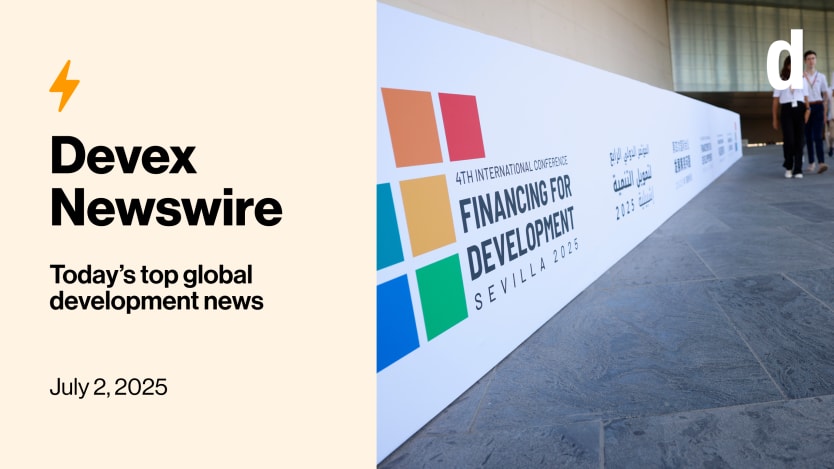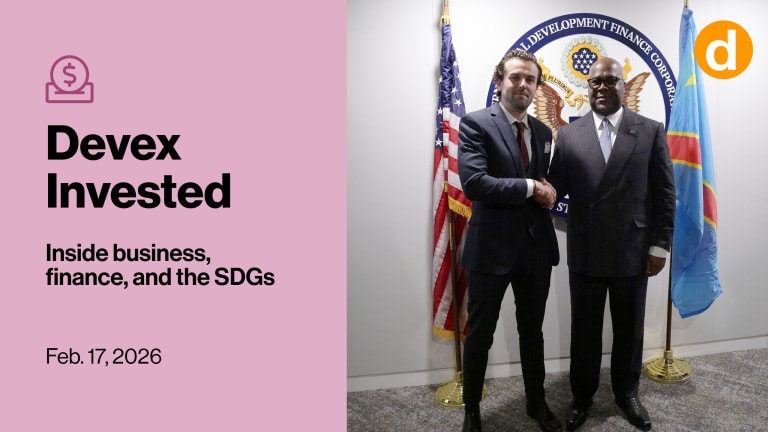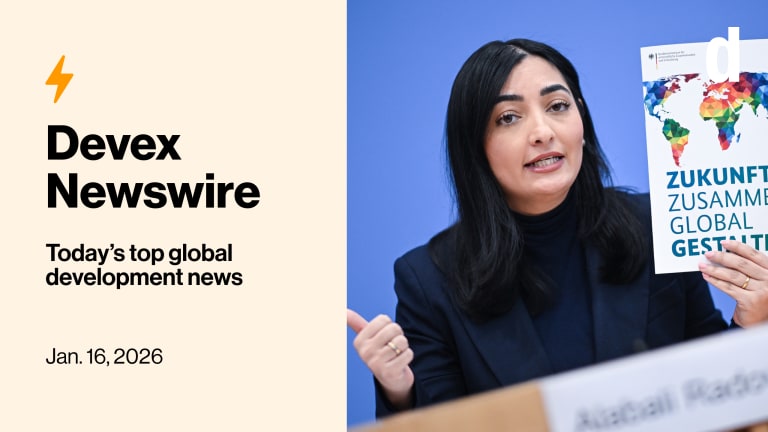
At FfD4 in Sevilla, Spain, delays, heat, and tight security set the tone — but so did bold pledges as governments floated new tax and finance initiatives. Whether talk turns to action is the question hanging in the humid Andalusian air.
Also in today’s edition: Why UNOCHA has set a lower target on humanitarian spending, and are DFIs falling short?
+ It’s news quiz time! Scroll to the bottom to see if you can ace our quiz!
Compromiso soup
If you came to the Fourth International Conference on Financing for Development, or FfD4, thinking you could run your own schedule — think again. Traffic? Brutal. Security? Slow. Hydration breaks? Nonnegotiable. Want to be on time? Show up at 4 a.m. and never leave the building. And journalists? Only allowed into main events with a U.N. escort.
But there’s a certain zen to letting go. As former president of the U.N. General Assembly (and literal poet) María Fernanda Espinosa puts it: “The imperfect outcome is not an end, but the means. It’s a pathway.”
That “imperfect outcome” is the Compromiso de Sevilla, adopted on Monday, with governments now taking to the mic to publicly align with it — or distance themselves.
“Let us be clear: It is not yet a breakthrough,” says Barbadian Finance Minister Ryan Straughn. “The true measure ... will be whether we bend the arc of history towards justice, towards action, and towards results on the ground for our people.”
Meanwhile, business leaders from J.P. Morgan, Citigroup, and others are mixing with policymakers, repeating a familiar refrain: Public money can’t do it all.
“Public finance needs to redirect to places where there is no financial gain,” says J.P. Morgan’s Faheen Allibhoy.
Collaboration with the private sector is a key part of the plan, but for that, the private sector also needs to show up. And of 75 businesses accredited by the International Chamber of Commerce to attend the conference, only 25 came. “I just don’t think there’s the same level of interest and excitement as there was in 2015,” says ICC’s Andrew Wilson.
And then came the tax talk. Spain, Brazil, and South Africa launched a coalition to tax the world’s wealthiest, citing the Sevilla’s outcome document’s call to “ensure progressivity and efficiency across fiscal systems.”
Other announcements? A push for social protection. New plans for climate-resilient agriculture. A $1 billion Amazonia bond. And a global effort to reform tax breaks.
By Day 2, it’s clear: This isn’t just another conference. “Getting multilateral agreements to stick means getting leaders to commit verbally,” says Minh-Thu Pham of Project Starling. “And we can better hold them to account later.”
So yes, Sevilla is hot, crowded, and chaotic — but also, maybe, quietly catalytic, says my colleague Jesse Chase-Lubitz, who is on the ground in Sevilla.
Read: Sevilla reporter's notebook Day 2 — Compromiso adopted, but what next?
Against the odds
Spain secured consensus among 193 countries at FfD4 despite the United States withdrawing from negotiations, while simultaneously increasing its own aid budget as traditional donors slash spending.
The Compromiso de Sevilla outcome document commits to tripling multilateral development bank lending and establishes a target of increasing social protection systems in low- and middle-income countries by two percentage points annually, even as the world's largest donor withdrew and rejected the U.N.’s Sustainable Development Goals.
Speaking at Casa Devex, Spain’s Ambassador for Financing for Development Mónica Colomer told Devex President and Editor-in-Chief Raj Kumar that FfD4 was “a test for multilateralism,” which may be proving that countries can still “join forces to find global solutions.” However, she warned “we cannot take solidarity for granted” amid debt distress and widening financing gaps.
Spain has doubled its development agency budget to €708 million over three years while the U.K. cut aid by 40% and the U.S. gutted USAID. The contrarian strategy reflects Spain's experience as a World Bank loan recipient until 1977.
“We were poor, not so far away,” Colomer said, emphasizing development cooperation as “investment, not charity.”
Watch: How Spain delivered consensus at FfD4 as multilateralism feels the strain
ICYMI: Spain's aid budget is rising — but has a long way to go
Sunny side of the street
“Even if one important country isn’t there, everybody else can say, ‘Well, look, this is what everyone else wants to do, so you’re alone on this.’ And eventually, I think the pendulum will swing back.”
— Min-Thu Pham, co-founder and CEO, Project StarlingIn another conversation at Casa Devex, Pham presented a positive view of Sevilla’s potential impact even without U.S. cooperation. She pointed to the progress made on many international agreements this year even beyond the Sevilla compromise — the pandemic accord agreed at the World Health Assembly in May; the legally binding High Seas Treaty, which moved forward at a recent U.N. conference; and progress made on a plastics treaty and global tax cooperation.
And even if not every part of an international agreement gets executed, she maintained, it “sets a bar for where the global community wants to go,” and that influences even the most powerful do-it-alone countries in the long run.
Read: What impact can FfD4 have without the US? Potentially a lot
Scaling back
The United Nations humanitarian arm has just launched a stripped-down emergency appeal for $29 billion, down from its original $44 billion, after receiving only $5.6 billion in funding so far this year — less than 13% of what’s needed.
“Brutal funding cuts have left us with no other option than to further reduce the number of people we are hoping to save,” says Tom Fletcher, the U.N.’s emergency relief chief. “We are left with the cruel math of doing less with less.”
The downgrade comes after a near-collapse in U.S. humanitarian aid, which last year made up nearly 40% of U.N. humanitarian funding, writes my colleague David Ainsworth. Now, at least 79 million people will no longer be targeted for help, 12,000 aid jobs have been cut, and 22 organizations have already closed.
“Make no mistake,” Fletcher warns, “our appeal for less money does not mean there are less needs. Quite the contrary.”
Read: Why has UNOCHA set a lower target for humanitarian spending?
Mystery data
Are development finance institutions more valuable for their data than their dollars? Maybe, said Gary Forster, CEO of transparency watchdog Publish What You Fund, speaking at Casa Devex during FfD4 in Sevilla.
His team just wrapped a big survey on transparency among international financial institutions. The verdict? Multilateral development banks are doing much better than DFIs — and that’s a problem.
One of FfD4’s big themes is private capital mobilization, but “private capital needs data from DFIs to understand where the investment opportunities actually are,” Forster said.
At the last FfD conference in 2015, the buzzword was “billions to trillions” — a big, bold ambition from the World Bank. A decade later, about half a trillion in private capital has been mobilized. Hardly a total failure, Forster noted, but the sector has not got anywhere near its ambitions.
He pointed to the Global Emerging Markets Risk Database, or GEMs, as proof that better data can drive results. Once GEMs was opened up, credit agencies changed how they rated Africa — and sovereign borrowing got cheaper.
But there’s still barely any data showing whether DFIs are actually creating jobs or tackling climate risk. Nor is it clear how effective loan capital is versus grants, or whether guarantees beat equity investments.
DFIs often cite commercial confidentiality, safety concerns, and banking regulations as reasons for withholding data. All valid, Forster said — but better handled with exceptions, not blanket secrecy.
Watch: Can DFIs be more transparent about their data?
+ In the wake of the Sevilla conversations, we’ll be hosting a discussion next week to unpack the road ahead for outcomes-based finance — long been seen as an innovative model, but one that’s complex, slow to scale, and limited to a handful of pilots. The CEOs of the British Asian Trust and Levoca will join us for this exclusive Devex Pro briefing on July 9. Save your spot now.
+ Not yet a Pro member? We offer a 15-day free trial. Try it out today to access all our exclusive content and events.
In other news
In a joint statement, more than 130 humanitarian organizations have called for the shutdown of the U.S.- and Israeli-backed Gaza Humanitarian Foundation, criticizing its military-led distribution model for exposing Palestinians to attacks. [Al Jazeera]
U.S. Sen. Jeanne Shaheen has introduced a bill that will require Congress to be notified of major layoffs of personnel at the State Department and other foreign affairs agencies. [The Hill]
The Democratic Republic of Congo military has shut down a plane that rebels claim was carrying food aid. [BBC]
Think you were paying atención?
Take the rest of our five-item news quiz based on June’s most-read news articles.
Sign up to Newswire for an inside look at the biggest stories in global development.
Search for articles
Most Read
- 1
- 2
- 3
- 4
- 5








